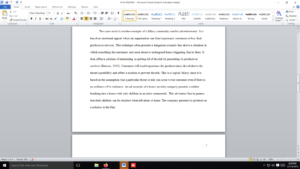Fallacies to Persuade and Possibly Manipulate
Tittle: Fallacies to Persuade and Possibly Manipulate
Choose Topic: Philosophy
Number of Pages: 1
Question Description: (GerMeka)
W3: Fallacies to Persuade and Possibly Manipulate
Goal: Observe how logical fallacies are used to persuade and at times, manipulate.
Course Objectives: CO2
Description:
Advertisements exist to sell you a product. It might be soap, music, political positions, or ideas. Most advertisements use a variety of logical fallacies to persuade but some use them to subtlety or overtly manipulate the intended audience.
Find an ad. You don’t have to repeat the entire ad, only enough to familiarize us with it…
(1) name the fallacy it commits
(2) define the fallacy and
(3) explain in detail how this ad is an example of this fallacy.
Perform the given exercise to understand it better.
Example:
An ad claims that “Nobody has ever proved to me that Shrest Whitening Strips are harmful” which erroneously implies that you know they aren’t.
– Review the list of logical fallacies in your content and study the ads presented.
– Select at least two (2) ads that you feel represent two (2) different logical fallacies.
– Determine how the language and images of the ads appeal to the consumer; identify the kinds of fallacies being used; and describe what needs or insecurities the ads are trying to reach.
– Explain the ads’ effectiveness.
Answer preview
The scare tactic is another example of a fallacy commonly used in advertisements. It is based on emotional appeal where an organization can fear to persuade customers to buy their products or services. This technique often presents a dangerous scenario that shows a situation in which something the customers care most about is endangered hence triggering fear in them. It then offers a solution of minimizing or getting rid of the risk by presenting its products or services (Barroso, 2019). Customers will tend to purchase the products since the ad shows the threat’s possibility and offers a solution to prevent the risk. This is a logical fallacy since it is based on the assumption that a particular threat or risk can occur to the customer even if there is no evidence of its existence. An ad example of a home security company presents a robber breaking into a house with only children in an aired commercial. This ad creates fear in parents that their children can be attacked when left alone at home. The company presents its products as a solution to the fear.
[399Words]

Fallacies to Persuade and Possibly Manipulate

